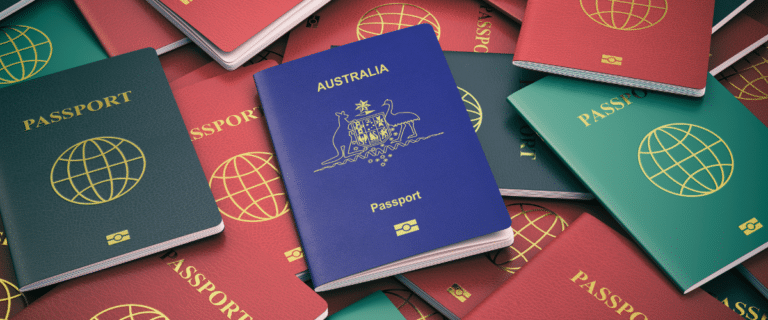On This Page...
ToggleDe Facto Visa Australia: Complete Guide for Couples
By Nilesh Nandan – Australian Immigration Lawyer, MyVisa® Immigration Lawyers
This blog is intended for discussion purposes only and does not constitute advice. You should seek independent legal advice before relying on any information provided on this site.
Immigration policies, systems, and processes can change without notice. I’d like to know your own experience with the immigration challenges noted above — feel free to contact me.
Table of Contents
Introduction
As an immigration lawyer, I meet hundreds of couples each year who are confused about what a “de facto visa” actually is. Many think it’s a separate visa subclass – it isn’t. Rather, “de facto” refers to your relationship type when applying for a Partner Visa in Australia.
If you are in a genuine, committed relationship but not legally married, you may be eligible for a de facto visa under either the onshore (Subclass 820/801) or offshore (Subclass 309/100) Partner Visa pathways. The law recognises your relationship if you can show that you and your partner have lived together for at least 12 months (or less, if registered under State law).
This guide explains everything — from proving your relationship, meeting eligibility, comparing onshore and offshore options, to avoiding costly mistakes that lead to refusals. Whether you’re already in Australia or applying from overseas, my goal is to help you understand exactly what to do and how to do it right the first time.
Understanding the De Facto Visa
The term “de facto visa” is commonly used but technically refers to the Partner Visa subclasses that apply to unmarried couples. Your relationship must meet the Migration Regulations 1994 definition of “de facto partner,” meaning you are not legally married, but have a genuine and continuing relationship and live together (or do not live apart permanently).
What the De Facto Visa Allows You to Do
- Live, work, and study in Australia while awaiting your visa outcome.
- Access Medicare (once the temporary stage visa is granted).
- Travel in and out of Australia freely once on the visa.
- Progress to permanent residence through the second stage of the Partner Visa.
Essentially, this visa recognises and protects genuine relationships that are not yet formalised by marriage, ensuring both partners can live together in Australia lawfully. ([immi.homeaffairs.gov.au](https://immi.homeaffairs.gov.au/visas/getting-a-visa/partner-onshore))
Eligibility Criteria for De Facto Partner Visa
To qualify for a de facto partner visa, you must demonstrate a relationship that satisfies strict legal requirements. These are set out under Regulation 1.09A of the Migration Regulations 1994.
Basic Eligibility Requirements
- You and your partner must be aged 18 or older.
- You must be in a genuine and continuing relationship to the exclusion of all others.
- You must live together or not live apart permanently.
- You must show that the relationship has existed for at least 12 months prior to application unless registered under state/territory law (e.g., NSW Relationship Register).
- Your partner must be an Australian citizen, permanent resident, or eligible New Zealand citizen.
Character and Health
Both partners must meet health and character requirements. This may include police checks from every country lived in for 12+ months and health examinations approved by Home Affairs.
Special Circumstances
There are exemptions to the 12-month rule. For example:
- If your relationship is registered under Australian State or Territory law.
- If compelling circumstances exist (e.g., children of the relationship, humanitarian protection).
- If you could not live together due to workplace, cultural, or visa restrictions but maintained evidence of commitment.
Proof of Relationship – The Core of Your Application
The single biggest reason partner visa applications fail is insufficient or inconsistent relationship evidence. Home Affairs assesses your relationship across four key factors:
- Financial aspects of the relationship
- Nature of the household
- Social aspects of the relationship
- Nature of your commitment to each other
Examples of Acceptable Evidence
| Category | Examples of Evidence |
|---|---|
| Financial | Joint bank accounts, shared bills, joint property lease or mortgage, tax declarations as partners. |
| Household | Shared rental agreements, joint utilities, correspondence to same address, photos of daily life. |
| Social | Photos together at family or social events, invitations addressed to both, statutory declarations from friends/family. |
| Commitment | Long-term plans, wills, superannuation beneficiaries, communication records showing emotional support. |
To strengthen your case, present your evidence in chronological order and include personal statements detailing how your relationship developed. The most convincing applications tell a consistent story supported by documentation.
Onshore vs Offshore De Facto Visa (820/801 vs 309/100)
You can apply for the partner visa as a de facto partner either while you are in Australia (onshore) or from outside the country (offshore). The two streams are structurally similar but differ in timing, processing, and conditions.
| Feature | Onshore (Subclass 820/801) | Offshore (Subclass 309/100) |
|---|---|---|
| Where You Apply | In Australia | Outside Australia |
| Temporary Stage | Subclass 820 (apply and stay in Australia while processing) | Subclass 309 (apply from overseas, may enter once granted) |
| Permanent Stage | Subclass 801 (usually assessed two years after 820) | Subclass 100 (assessed after 309) |
| Work Rights | Full work and study rights after 820 grant | Full work rights after 309 grant |
| Medicare | Eligible after 820 grant | Eligible once in Australia after 309 |
| Processing Time | 16–28 months on average | 15–29 months on average |
| Cost (as of 2025) | From AUD 8,850 | From AUD 8,850 |
| Advantages | Allows you to remain in Australia while waiting | Ideal if you cannot enter Australia yet |
| Disadvantages | Bridging visa delays if previous visa expires | No bridging visa protection before arrival |
For most couples already together in Australia, the onshore route offers convenience and security. However, offshore applications may suit those separated by border, work, or timing constraints.
Step-by-Step Application Process
The de facto partner visa involves two stages — temporary and permanent. You lodge one combined application and pay one fee.
- Confirm eligibility – ensure your relationship meets de facto criteria and that your partner is an eligible sponsor.
- Gather evidence – compile all documents proving your relationship across the four categories mentioned above.
- Create an ImmiAccount – all partner visa applications are lodged online.
- Complete the Partner Visa Application Form – provide accurate details about both partners.
- Your partner lodges the Sponsorship Form (Form 40SP) – this must be done soon after your main application.
- Upload documents – certified copies of passports, evidence, and statutory declarations (Form 888 from witnesses).
- Pay the visa fee – AUD 8,850 (as at 2025), payable once for both stages.
- Receive Bridging Visa (onshore only) – if your current visa expires while awaiting decision.
- Attend health and character checks – police clearances and medical exams.
- Wait for decision – first the temporary stage (820/309), then after ~2 years, the permanent stage (801/100).
For complex cases — e.g., previous visa cancellations or criminal records — seek professional assistance. I’ve represented clients who faced visa cancellations and visa refusals but succeeded on appeal by providing stronger, better-organised evidence.
Processing Time, Cost & Timeline
Cost
- Visa application charge: AUD 8,850 (main applicant).
- Additional applicant (18+): AUD 4,430.
- Additional applicant (under 18): AUD 2,215.
Processing Time (as at October 2025)
- 75% of applications: 16–28 months for Subclass 820.
- 90% of applications: up to 32 months for Subclass 801/100.
Timeline Overview
| Stage | Description | Average Duration |
|---|---|---|
| Preparation | Gathering documents, drafting forms | 1–3 months |
| Application lodgement | Online submission via ImmiAccount | Immediate |
| Bridging Visa (if onshore) | Activates after current visa expires | Varies |
| Temporary Visa Grant | Subclass 820/309 issued | 16–28 months |
| Permanent Visa Stage | Subclass 801/100 assessment | ~24 months after temporary stage |
Common Reasons for De Facto Visa Refusals
Visa refusals often happen not because the relationship is fake, but because the evidence fails to meet legal standards. Common reasons include:
- Insufficient evidence across one or more of the four relationship categories.
- Contradictions in personal statements and witness declarations.
- Failure to meet the 12-month cohabitation requirement or prove exemption.
- Incorrect or outdated statutory declarations (Form 888).
- Inconsistent address or travel records between partners.
- Not disclosing previous visa refusals or cancellations.
- Not providing certified translations for non-English documents.
If your application has been refused, it may still be reviewable at the Administrative Appeals Tribunal (AAT). My team frequently helps clients file successful appeals by fixing the evidence gaps that led to the initial refusal.
Real-Life Scenarios & Legal Insights
Case 1 – Student and Australian Citizen
Maria, an international student from Brazil, began living with her Australian partner while finishing her degree. They applied for the onshore de facto visa before her student visa expired. By showing joint bank accounts, shared lease, and social evidence, her 820 was granted within 20 months. She later obtained permanent residency under subclass 801.
Case 2 – Couple Living Apart Due to Work
Sanjay worked in Perth while his partner Priya was posted interstate. They saw each other monthly and maintained a joint bank account. Though living separately, they documented constant communication and registered their relationship in NSW, meeting exemption requirements. Their offshore application was approved after 24 months.
Case 3 – Visa Refusal Overturned
A de facto visa for a same-sex couple was initially refused due to inconsistent timelines in their statements. Upon appeal, we demonstrated the relationship history with additional witness declarations, digital communication logs, and statutory declarations correcting the errors. The AAT set aside the refusal and the visa was granted.
Evidence & Document Checklist
Before submitting your application, ensure you have the following:
- Identity documents (passports, birth certificates, photos).
- Relationship evidence: financial, household, social, and commitment proof.
- Police clearances for both partners.
- Health check results (authorised panel physician).
- Form 888 declarations from two or more Australian citizens or PRs.
- Proof of sponsor’s citizenship or PR status.
- Relationship registration certificate (if applicable).
- Translations of non-English documents.
- Cover letter summarising relationship and evidence.
Frequently Asked Questions
- How long does it take to get a de facto visa in Australia?
Processing times vary, but most onshore applications take 16–28 months for the temporary stage, and permanent stage follows about two years later.
- How much does the de facto visa cost?
The visa charge starts from AUD 8,850 for the main applicant, plus additional charges for family members.
- What happens if my relationship ends before the permanent stage?
Your visa may be cancelled unless there are special circumstances such as domestic violence or a child of the relationship.
- Can my de facto visa be refused under Section 501 (character grounds)?
Yes. If you fail the character test under Section 501 of the Migration Act 1958, your visa can be refused or cancelled. Seek legal representation immediately.
- Can I apply if we have not lived together for 12 months?
Yes, if your relationship is registered in an Australian state or there are compelling circumstances like having a child together.
- Do I need to be onshore for the permanent stage?
- Yes, for subclass 801, you must be in Australia at the time of decision; for 100, offshore at the time of decision.
Book a Consultation
The de facto visa process can feel overwhelming — but with the right guidance, it doesn’t have to be. I’ve helped thousands of couples navigate this complex area of law successfully, even after refusals or cancellations.
Book a consultation with me today to discuss your visa situation.
For further resources, visit Visa Refusals, Visa Cancellations, Partner Visas, and Contact MyVisa to arrange your consultation.
Legal Disclaimer
By Nilesh Nandan — Australian Immigration Lawyer, MyVisa®️ Immigration Lawyers
This blog is intended for discussion purposes only and does not constitute advice. You should seek independent legal advice before relying on any information provided on this site. Immigration policies, systems, and processes can change without notice. I’d like to know your own experience with the immigration challenges noted above — feel free to contact me.
MyVisa: Nilesh Nandan, Attorney at Law
BBus(Accy) LLB(QUT) GDLP MBA(IntBus)
Head of Practice




523 Responses
how about if the de facto is married
Thank you very much for your post and your patience. Here are the first three (3) things that come to my mind 😊
1. You can be in a de facto relationship even if one or both people are still legally married to someone else, as long as you are genuinely living together as a couple and clearly separated from your former spouse.
2. Immigration is more focused on the reality of your relationship – whether you live together, share finances, and are committed to a life together – rather than your legal marital status.
3. If one partner is still legally married, you’ll need strong evidence to show the relationship is genuine and ongoing. Be prepared to explain how and when your current relationship began ❤️
There may also be other important issues that arise from your particular circumstances.
Seek specific immigration law advice before taking any further steps.
You might find these helpful:
https://www.myvisa.com.au/partner-visa/ – Partner visa options
https://www.myvisa.com.au/visa-refusal/ – Visa refusal advice
https://www.myvisa.com.au/bridging-visa/ – Bridging visa help
Regards
Nilesh Nandan
BBus(Accy) LLB(QUT) GDLP MBA(IntBus)
Immigration Lawyer & Special Counsel
MyVisa Immigration Law Advisory
https://myvisa.com.au
Disclaimer: In the interest of speed, my communications are transcribed and transmitted using voice-to-text software – please ignore any unintended typographical or interpretation errors. See Notes and Disclosures at the footer of my work emails.
I have some questions about De Facto Partner Visas. What’s the process for booking a consultation?
Hi Faris,
You can book a consultation with me by visiting [myvisa.com.au/appointment](https://myvisa.com.au/appointment).
For complex matters, please schedule a formal consultation. For simpler queries, you’re welcome to use my 10-minute service.
Looking forward to helping you further! 😊
Regards,
Nilesh Nandan
Immigration Lawyer & Special Counsel
MyVisa® Immigration Law Advisory
https://myvisa.com.au/
My son who is an Australian citizen and his girlfriend came over to Perth 2 years ago from the UK ( she is English) when they were here she got pregnant and wanted to go back to the UK, so they went back to the UK, they have just applied for citizenship by descent for my grandson because now they want to come back to Australia.
What would be the best way for my son to get his girlfriend and mother of his baby out to live in Australia
Hello I am a 53 year old Australian woman who is in a relationship with a 24 year old Egyptian man. We have been living together in my home for the last 14 months. Will the age difference be a problem obtaining this visa?